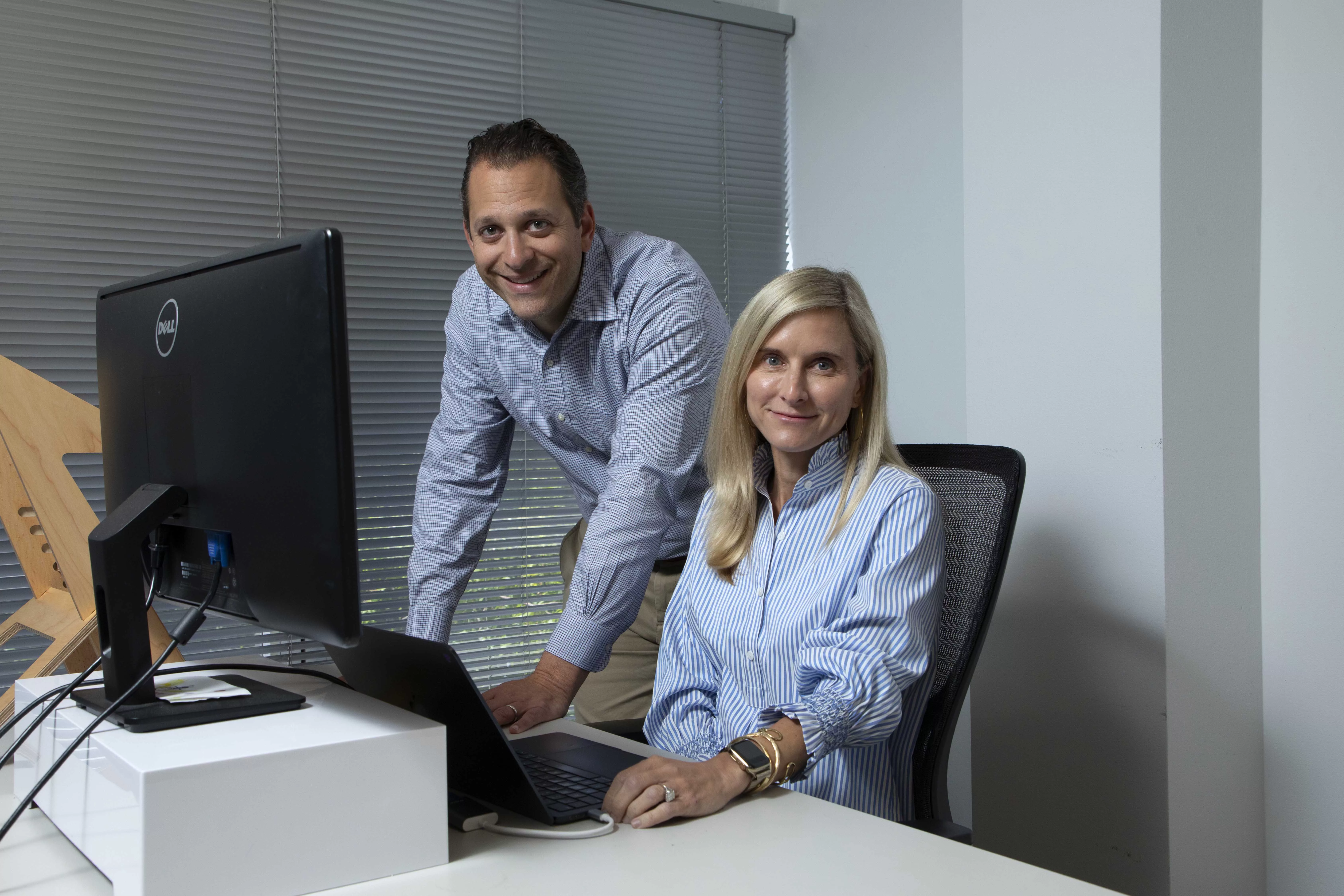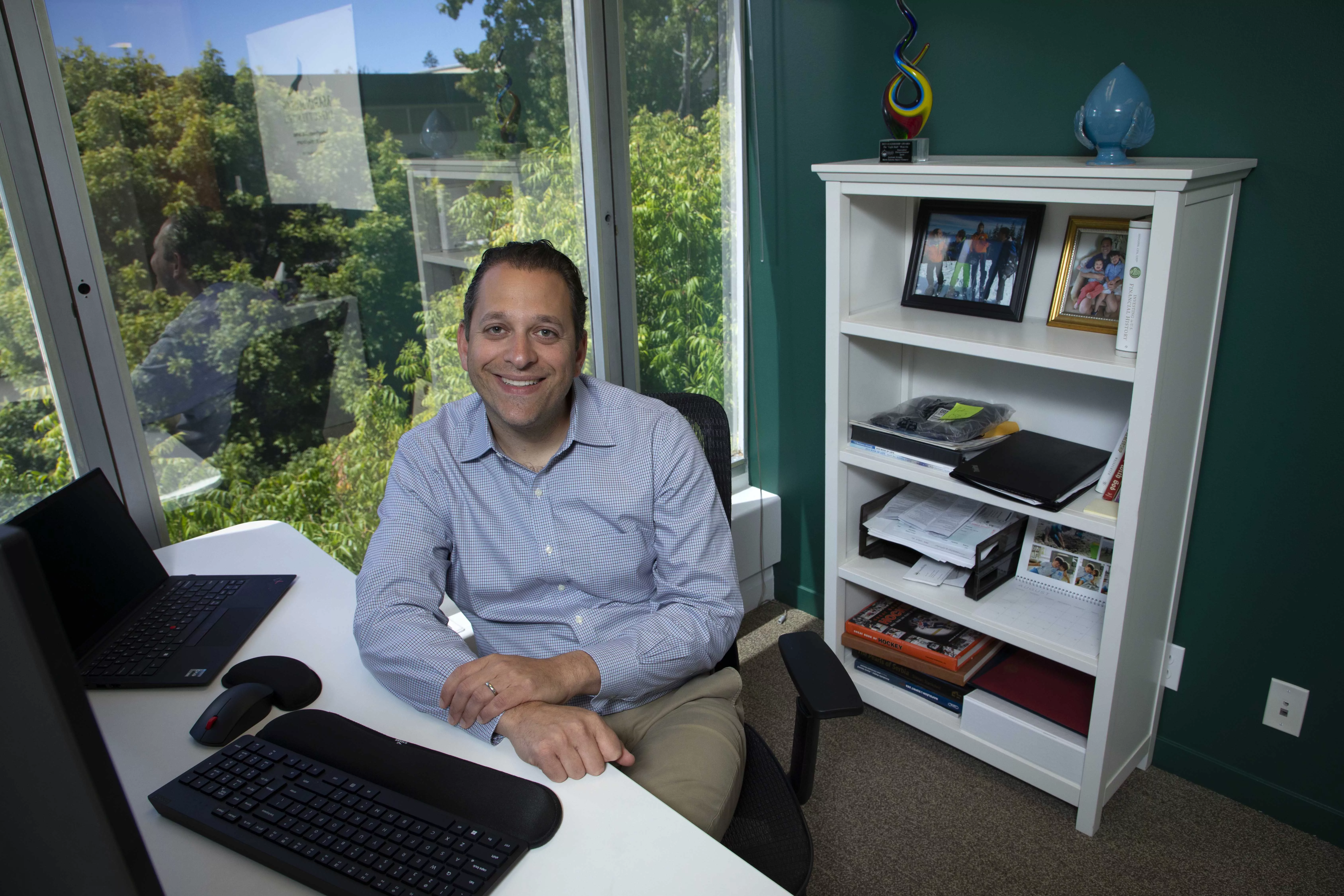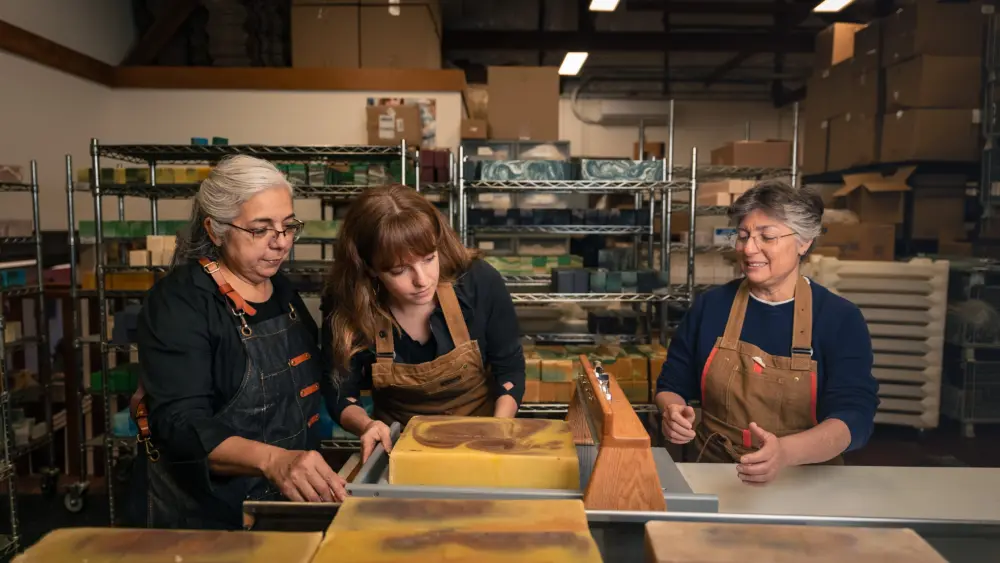
MSIV founders Zachary Kushel and Elizabeth Murphy at their offices in San Rafael.
A nervous Emily Harburg took a deep breath and picked up the microphone. The presentation she was about to make to some 300 North Bay investors, partners and residents was key to the funding she was seeking for PairUp, her Sausalito startup.
Harburg was presenting along with 10 other companies at the April NEXT 2023 networking conference held in Rohnert Park by Marin Sonoma Impact Ventures. MSIV is a Corte Madera venture capital firm that launched in 2020 with the goal of helping Marin and Sonoma County startups grow.
“We invest in early-stage startups looking to become the next Amy’s Kitchen or BioMarin Pharmaceutical,” says MSIV co-founder Zachary Kushel. Petaluma-based Amy’s Kitchen sells its organic dishes in 30 countries around the world. San Rafael-based BioMarin is a pharmaceutical company that reported revenues of $2.4 billion in 2023.
“We are the first regional venture capital fund for local county startups. We’re venture capitalists on a community level,” Kushel says.
Kushel cofounded MSIV with Elizabeth Murphy, its vice president of community. The firm helps startups in Marin and Sonoma counties grow in two ways: networking and financing.
The company’s annual NEXT conferences are an example of the former—giving early-stage businesses a chance to take the spotlight in front of the business community. The April 2023 meeting was the second such event, held at the Sonoma State University campus in Rohnert Park. The third conference took place in Novato in May 2024.

Participants had five minutes to describe their companies using just five slides.
“My usual presentation has 15 slides. I spent hours and hours paring it down,” says Harburg. The Sausalito resident and Harvard graduate has designed technology for Disney theme parks and also worked for Meta (Facebook), among other roles.
In addition to the NEXT events, Murphy and Kushel have assembled a group of 27 former CEOs who are part of an executive advisory and mentoring network.
The other component of MSIV’s approach is financing. Marin Sonoma Impact Ventures has funded 10 North Bay companies so far: Channel99, Finalis, Fire Aside, Jump Aero, NewRetirement, Novi, Operant Networks, PairUp, Sageful AI and Union Credit.
When choosing which startups to invest in, MSVI looks for companies that are “post-product and post-revenue. They have a product, they have customers and they are at least to some extent making money,” Kushel says.
“It’s team, market and traction,” Kushel adds. Companies with all three—a good team, an appropriate market and early successes such as sales—fill the bill, he says.
From a market standpoint, MSIV is a venture capital fund, so it must invest in companies building a large market, he says. “We want to create companies that are valued in the hundreds of millions of dollars.”
Over the course of the 34 months Marin Sonoma Impact Ventures has been deploying capital, over 220 local companies were considered and only 10 were chosen, the cofounder says.
“We are very selective,” says Kushel.
To pool the money for investments, MSIV created a locally raised fund, Fund One. MSIV Fund One is a $6.6 million vehicle backed by 62 individuals, 92% of whom live in Marin and Sonoma counties.
“It was ‘pass the hat and community fundraise,’” Kushel says. “Fund One is the first ever regional bank for capital funds in the history of Sonoma and Marin counties.
“I’m the first person with a fiduciary obligation to spend this money in Marin and Sonoma,” he adds.
Though there have been waves of layoffs in the tech sector over the past couple of years with a ripple effect on the overall economy, Kushel says, “Despite the economic headwinds, our companies are doing well and building their customer bases. Our portfolio overall has not been negatively impacted.”

As to how the fund is doing, “The goal of our fund is to have exceptional returns over the course of 10 years. So far, we’re 34 months old, so less than three years into that 10-year cycle. We’ve looked at benchmarking data on the performance of other funds that are the same vintage as us and, according to that data, we are outperforming peer funds,” the cofounder says.
Investors include Mill Valley’s Paul Solli, co-founder of Sausalito-based Aperio Group, now part of BlackRock; Petaluma’s Tom Isaak, a longtime local entrepreneur and founder and chairperson of Petaluma-based CourseCo, Inc., a golf course management company operating around 40 golf courses in the western United States.
Additional investors include Jake Walker, a San-Rafael-based attorney; Blair Kellison, prominent Petaluma businessperson and former chief executive of Sebastopol-based Traditional Medicinals; and Craig Nelson, chair of the board of San Rafael-headquartered Nelson Connects, an employment services firm.
The idea of keeping local capital in the North Bay and investing in local companies was what drew Nelson to MSIV, he says.
“We have a lot of wealth here in Marin and Sonoma, but it tends to migrate south to San Francisco and Silicon Valley,” says Nelson. The bulk of venture capital investment has long taken place in Silicon Valley and, later on, to some extent San Francisco.
“I love the idea that MSIV is creating jobs in Marin and Sonoma,” says Nelson, who put his own money into the fund. His company is not affiliated with MSIV, though especially as an employment firm, it stands to benefit in the long run.
MSIV will potentially benefit Nelson Connect and other firms “in that we will have a stronger local economy and have new companies growing here,” says Nelson.
The investor says that if there are more jobs with higher-paying, exciting companies, the children of established older residents might be able to return to the North Bay and get good jobs.
“I’m passionate about making money and helping people at the same time,” Nelson says.
At present, the target investment of the fund is roughly $350,000 per company, according to Kushel. “It could be slightly less or more, but our sweet spot is $350,000 in the seed stage of financing.”
There are many startups in Marin and Sonoma that receive angel funding or seed money from venture capital firms, says Mike Blakeley, chief executive officer of the Marin Economic Forum.
“I don’t know that they [MSIV] are the only venture capital firm that is funding startups in the North Bay, but they are the only one that has that as their mandate,” says the chief executive, who has over 20 years’ experience working in the public and private sector.
“We are out to help people in a way that has a low environmental impact—and make money.”—Carl Dietrich, Jump Aero
Another unique element is Marin Sonoma Impact Venture’s focus on the personal side of business. The cofounder of Petaluma-based Jump Aero, another company receiving MSIV funding, says Kushel found the company attractive because it focuses on saving lives.
“We are making an electric aircraft technology that can dramatically reduce the emergency response times in rural areas,” says Carl Dietrich, president and chief designer of Jump Aero. Dietrich founded the company with Jeff Myjak and Katerina Barilov.
The company is working with clients including the U.S. Air Force to create a prototype electrical aircraft for first responders. The reason for focusing on rural areas is that response times in these areas are generally longer, which can make the difference between life and death.
Jump Aero also met MSIV’s investment criteria in that it had already gotten funding from other investors, Dietrich says.
Also, Kushel “was drawn to a noble mission. We are out to help people in a way that has a low environmental impact—and make money,” says Dietrich, who is an MIT graduate and led the flying car company Terrafugia from founding through acquisition.
Like Jump Aero, the mission of Harburg’s startup, PairUp, is to help people—in this case, employees at a given company.
When a team member at a company doesn’t know how to solve a problem and doesn’t know who to turn to, PairUp’s software can help them identify and connect with the teammates and documents with the answers. Also, like Jump Aero, the company has received funding from other firms in addition to MSIV.
As she wound up her NEXT 2023 presentation, Harburg said, “We think connections shouldn’t be left to chance. This is where technology can connect people—and then let humans be humans.”
As the presentation concluded, the room rocked with applause and a few “woo-hoos!”
“People were really responsive,” Harburg says. “I got lots of eye contact and it was great afterward to talk to people. It was a great reception.”




